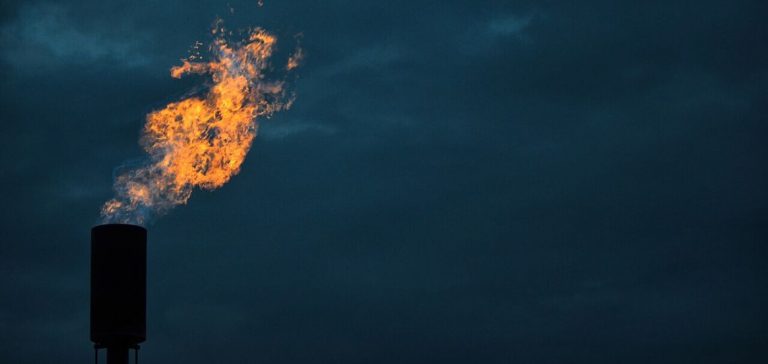Large oil companies are once again at the center of controversy due to a lack of transparency over their carbon dioxide (CO2) emissions generated by flaring. An international investigation coordinated by the *European Investigative Collaborations* (EIC) network and conducted by several media outlets, including Mediapart, highlights a systematic underestimation of greenhouse gas emissions by these groups in 18 African and Middle Eastern countries between 2012 and 2022. In 2023, flaring generated 381 million tons of CO2, or 1% of global emissions.
Flaring, a process used to eliminate natural gas released during oil extraction, is a common yet controversial method. Although technological alternatives exist to recover or reinject it, their adoption remains limited. According to the investigation’s data, the Algerian group Sonatrach is one of the main contributors, with 235 million tons of CO2 emitted over eleven years. Other companies like BP, Shell, ExxonMobil, and TotalEnergies are also among the largest emitters.
A Persistent Lack of Transparency
One of the main concerns raised by the report is the opacity in flaring emissions reporting. Some companies, particularly in Europe, only publish global figures, without any breakdown by facility, making it difficult to assess their real impact. For example, TotalEnergies only includes the emissions from infrastructures it directly operates, excluding those where it has partial involvement. While this approach is in line with industry standards, the EIC criticizes it for not accurately reflecting the complete picture of the pollution generated.
The methodology used by the investigation, based on satellite imagery analysis of 665 oil and gas facilities, reveals significant discrepancies between the figures reported by the companies and the actual emissions observed. Some companies like Shell argue that these satellite measurements lack the necessary precision to properly estimate the volumes emitted. Nonetheless, the study’s findings highlight a gap between public decarbonation commitments and actual practices on the ground.
Majors Under Regulatory Pressure
The opacity in flaring emissions arises amid increasing pressure on companies to improve environmental transparency. In several jurisdictions, including the United States, the United Kingdom, and the European Union, regulators are tightening reporting requirements, imposing stricter audits. Meanwhile, initiatives like the World Bank’s *Global Gas Flaring Reduction Partnership* (GGFR) urge states and companies to reduce flaring and adopt recovery technologies.
However, despite these initiatives, the EIC report shows that few actors fully meet their commitments. The majors cite technical obstacles and high costs to justify their continued use of flaring, while the necessary infrastructure to reinject the gas or use it for other purposes remains insufficient in many regions. This raises questions about the companies’ ability to deliver on their decarbonation promises amid increasing regulatory pressures.
Mixed Reactions from the Companies
In response to the accusations, the companies’ reactions vary. TotalEnergies defends its methodology, stating that its calculations comply with international reporting standards. The group criticizes the study for its lack of external verification and highlights the variability of data obtained by satellite. Shell, for its part, also rejects the conclusions, stating that its own reports comply with the regulations in the countries where it operates. Neither ExxonMobil nor Chevron commented on these accusations.
Flaring remains a complex issue for regulators and companies, as it underscores a persistent gap between decarbonation commitments and actual practices on the ground. The continued use of this method demonstrates that, despite technological advances, financial pressure and technical constraints hinder the adoption of cleaner solutions. It also reflects a broader issue of governance and responsibility within the oil sector, where practices differ according to regions and local regulations.






















